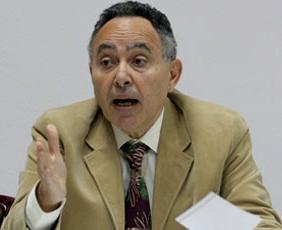 According to the Director of the Cairo Institute for Human Rights Studies (CIHRS), Bahey eldin Hassan: “Mubarak’s trial is a historical eventfor the Arab world. But it is regrettable that he is only being prosecuted for crimes committed during the revolution.”
According to the Director of the Cairo Institute for Human Rights Studies (CIHRS), Bahey eldin Hassan: “Mubarak’s trial is a historical eventfor the Arab world. But it is regrettable that he is only being prosecuted for crimes committed during the revolution.”
Commenting on Mubarak’s trial this morning in numerous interviews with the media, the Director of CIHRS emphasized the historical importance and meaning of Mubarak’s trial, not only for Egyptians, but for all Arab people. He said that this was the first time in modern history that an Arab people had been able to prosecute a President for his crimes. According to Mr. Hassan, although Saddam Hussein was tried and Omar al-Bashir has been referred to the International Criminal Court (ICC), Mubarak’s trial is different. Hussein was prosecuted underthe US occupation of Iraq; Bashir has not yet appeared before the ICC, and his trial before that court will not take place in Sudan, though this should not discredit the ICC proceedings.
Hassan stated that he regretted that the former President was only being tried for crimes committed on five days, from January 18 to February 2 of this year, and that no less atrocious crimes committed over the three decades of his rule were not being prosecuted.
The same is true of the former minister of interior Habib al-Adli’s trial, Hassan said. Adli is not being tried for crimes committed during the 13 years he served as Interior Minister, during which he was responsible, under the supervision of Mubarak and his aides, for supporting thepillars of the police state, routine, systematic torture, and the repression of political enemies and dissidents.
The primary objective of these trials are thus to achieve justice for a small segment of the Egyptian people—the victims and martyrs of therevolution—while millions of other Egyptians are denied justice for no less horrible crimes committed by Mubarak and his regime over 30 years.
Commenting on the decision to postpone the trial to the middle of this month, Hassan said, “It looks as if the trials will be protracted, and no one knows which will ultimately prove shorter—the trial itself or Mubarak’s life.” He refused to comment on Mubarak’s apparent health in thecourtroom, saying that he is not a doctor or specialist qualified to judge his health or the need for Mubarak to appear on a stretcher in thecourtroom.
Share this Post
